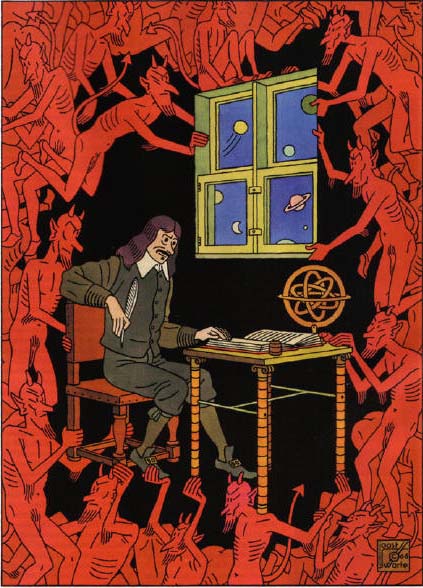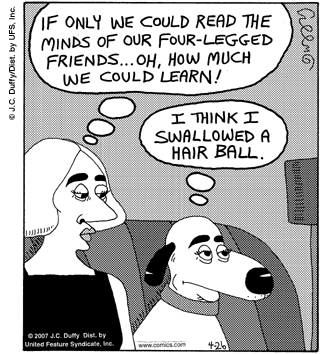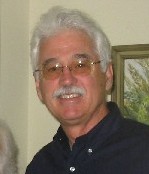Phil. 181
Metaphysics
Philosophy 181
Spring Semester 2017
Prof. Dowden

Catalog
description:
Metaphysics is a blind alley of thought into which fiends have conspired these many centuries past to lure the human intellect to its destruction. 3 units.
Ok, here is the official university catalog description:
PHIL 181. Metaphysics. Examines
arguments concerning the nature of reality. Representative topics
include: substance, space, time, God, free will, determinism,
identity, universals. Emphasis is on contemporary formulations.
Prerequisite: 6 units in philosophy or instructor permission. Graded: Graded
Student. Units: 3.0More catalog description:
The above catalog
description is not exactly what is stated in our university catalog, is it?
Textbook:
An Introduction to Metaphysics by John W. Carroll and Ned Markosian, Cambridge University Press. The book is available online or in print [$14.60 on Kindle and $18.74 used on amazon.com]. It is also available in the Hornet Bookstore. We will be skipping chapters 2 and 4. Other required reading assignments (and videos) will be available only on the Internet; see below for the Schedule of Topics and Reading Assignments.
Grades:
Your grade will be determined by a class presentation, three essays, and a final exam. Your presentation to the class counts for 20%. The first essay assignment is worth 10%. Essay 2 is worth 20%. The third essay is a seven-page essay worth 25%. The two-hour comprehensive final exam is worth 25%.
Here are the due dates:
essay 1: Thursday, Feb. 2 (week 2).
essay 2: Thursday, Mar. 2 (week 6).
essay 3: Thursday, April 13 (week 11).
final exam: Thursday, (week 16, May 18, 10:15).
Turn in your essay on paper in class.
On the day of your class presentation, you will give a 15 minute presentation on that day's class material that includes responding to questions from other students and asking one or two questions of your own in order to stimulate group discussion. Your presentation should be an introduction that explains some of the main points made in one or more of the required readings or viewings for that day. Think of yourself as introducing and explaining the reading to students who didn't read the assignment.
Before 7:00 P.M. on the night before your presentation, you must email your professor at dowden@csus.edu with a brief outline of your presentation. The outline should list six or more separate phrases or sentences, followed by at least one class discussion question that is related to the philosophical material in your presentation and that you plan to ask the class near the end. A sample outline of a student presentation is available in SacCT. Coordinate your presentation with the other student who is speaking during your week so that you don't have too much overlap (but some overlap is OK). The sign-up list for who is presenting which topic on which day is also available in SacCT. Make sure your name eventually gets on this list. Sign-ups for this list will begin on the first day of class; first-come, first-served.
It is recommended for the essays that you follow the Department's writing guidelines posted at http://www.csus.edu/phil/guidance/writing%20guidelines.html.
Schedule of Topics and Reading Assignments:
Click here to see the schedule of weekly topics and reading assignments.

Prerequisites:
Six units of college philosophy. The prerequisite requirement might be waived if you talk to me about your interests and experience.This course will presuppose that, from other philosophy courses, you have already learned a few philosophical skills. Specifically, (1) you know how to read a philosophy article [as opposed to, say, a novel], compose a summary or abstract of it, and also extract the author's thesis from that article. A thesis is a sentence or two that states the main point the author is trying to make. (2) You know how to detect an argument by analogy even if it doesn't use any form of the word "analogy." (3) You know how to construct a philosophical essay, including writing a draft, revising the draft, using quotations, citing outside sources of ideas, and avoiding plagiarism.
Add-Drop:
To add the course, try to do so
by using CMS. If the course is full, but you want to enroll then sign the waiting list on the first day of class or email me in advance. If you are a graduating
senior this semester and are majoring in philosophy, then mention this. To drop the course
during the first two weeks, use the CMS system; no
paperwork is required. After the first two weeks, it is harder to drop,
and a departmental form is required: "Petition to Add/Drop After
Deadline." As with any university course, make sure you are dropped
officially (by CMS or by the instructor or department secretary);
don't simply walk away into the ozone or else you will get a "U" grade
for the course, which is counted as an "F" in computing your G.P.A. (grade
point average).

Goals:
At the end of our semester, you can
expect to have a good understanding of the difference between
metaphysics and other areas of philosophy. You will know about the
major metaphysical problems and the variety of their solutions. During
our course, you will acquire the ability to read professional-level
writing in metaphysics, and to formulate your own metaphysical
positions. That is, your goal isn't merely to figure out the position
of the author you happen to be reading; it is also to figure out
whether you are going to accept that position and why. As a final
goal for our course, the assignments are designed in part to improve
your skill at writing a persuasive essay that does not commit the fallacy of confirmation bias.

Prof. Dowden
Professor:
My office is in Mendocino Hall,
room 3022, phone 278-7384. My weekly office hours for Fall Semester 2017 are Tuesday and Thursday 11:45-1:00 and online in SacCT every Wednesday evening 8-10 p.m. Feel free to stop by in person during the Tuesday and Thursday office hours or call at any of those
times. If those hours are inconvenient for you, then we can arrange an
appointment for an alternative time. Also, you can always send me e-mail any
time at dowden@csus.edu
More Description of the Course:
Metaphysicians ask fundamental questions
concerning the general nature of the world. (1) Are there principles and characteristics that apply to everything? (2) What is ultimately real? Another way to describe a metaphysics course is to say we will study these issues: free will, the
nature of consciousness, personal identity, time, space, change, God, infinity, and abstract objects.
Our readings will be from the Western philosophical tradition, and most
will represent an analytic perspective.
We will study, among other things, the pitfalls of reification, which is the process of regarding something abstract as a material thing. Here is an example. "The past hit me in the face like a bloody hand," says a hard-boiled buckaroo in a Raymond Chandler novel. But we metaphysicians know the past isn't an object that can do this sort of thing. We metaphysicians cannot always take literally the musings of a Montana cowboy. When can we take remarks literally and not be metaphysically misleading? Ah, there's the rub, and it is one goal for our course.
A major area of academic metaphysics is ontology. It is the study of what exists and what doesn't exist. For example,
But there are other topics in metaphysics that do not involve ontology directly. Here are some of those topics:Does redness exist?
Do possible things exist?
Does the past exist?
Does telepathy exist?
Is there life after our death?
Which animals have consciousness?
When does a fetus become a person?
Does time emerge from something more basic?
Are free will and determinism compatible?
Why is the universe not empty?
How do mental causes lead to physical effects?
Can a statement about tomorrow be true today?
What is the meaning of life?
Is biology wholly based on physics in principle?
Could a special robot become conscious?
Consider this question: Why are stars so much bigger than people? This is an interesting question. It once was a metaphysical question, but now it is not. The reason it is not is that the question can be investigated so much more fruitfully by using scientific techniques. Actually it has been answered that way. Science says stars need to be so much bigger in mass than people in order to have sufficient internal gravitational pressure to ignite the process of thermonuclear fusion that makes them shine.
Some areas of metaphysics have to do with what lies beyond—with what is abstract and perhaps transcendent. Our course is influenced by this vision. But we cannot do metaphysics merely by revealing our vision. A metaphysics should be much more than a poetic vision. It should be a theory or a systematic group of basic beliefs backed up by convincing arguments intended to compel assent from any rational thinker. Quite a goal, right?
Our course is not historically oriented. We will not march through the field of
metaphysics century by century. Instead, our course is problem-oriented
or issue-oriented. We will inquire about specific topics and study them with no
particular attention to history except as it enriches the current
discussion.

Just the other day, I was an Indian
Following a coyote's trail.
If I had gotten a little closer to the Earth
I could have been the coyote
Making the trails.
If I had gotten even closer,
I could have been the Earth
Upon which they walked.
By trading on the imprecision in the word "closer," the proverb makes a point about the way Indians view the universe. The proverb also raises a metaphysical problem that is called the problem of personal identity. To appreciate the problem, consider what it means to say, "I could have been the coyote." Could you really have been a coyote instead of a human being? No, say some critics, because you'd lose your personal identity if you were a coyote. That is, you'd lose what it is that makes you be you. The Princeton University philosopher Saul Kripke said you can't be you unless you have the parents you do have, and, because your parents never gave birth to a coyote, it follows that you cannot possibly have been a coyote, and so the Indian proverb is incorrect, if it is interpreted literally. There are responses to Kripke that defenders of the proverb might offer as they try to defend their position, but we won't pursue these now. Instead, let's just note that we have approached some metaphysical material within American Indian folklore by using the tools of the analytical philosopher. By asking the question, "Could you really have been a coyote?" and expecting a careful definition of personal identity in order to assess the answer, we are demonstrating one of the methods used by the analytical philosopher.
Late work, and make-up assignments:
I
realize that during your college career you occasionally may be unable
to complete an assignment on time. If this happens in our course,
contact me as soon as you are able. If you provide a good
reason for missing a test or homework assignment (illness, accident, and so forth), then I'll use your grade on the final
exam as your missing grade. There will be no make-up tests nor make-up
homework.
I do accept late assignments with a grade
penalty of one-third of a letter grade per 24-hour period beginning at
the class time the assignment is due. Examples.
If you turn in the assignment three hours after it is due, then your A becomes an A-.
Instead, if you turn in the same assignment 30 hours late, then your A
becomes a B+. Weekends count, so turn in your late work by email if possible (no need to follow up with a paper copy). No late work will be accepted
after the answer sheet has been handed out (often this will be at the
next class meeting) nor after the answers are discussed in class, even
if you weren't in class that day.
Late essays may be submitted either by email attachment or on paper, but do not use both methods of submission.
Computers and cell phones:
No photographing or recording during class
is allowed without permission of the instructor. During class, turn off your cellphone's ringer. Your computers may be used only for note taking, and not for browsing the web, reading emails, or other activities unrelated to the class. If you use a computer during class, then please sit in the back of the room or in a side row so that your monitor won't distract other students.
Disabilities:
If you have a documented disability and
require accommodation or assistance with assignments, tests,
attendance, note taking, and so forth, then please see me early in the semester so
that appropriate arrangements can be made to ensure your full
participation in class. Also, you are encouraged to contact the
Services for Students with Disabilities (Lassen Hall) for additional
information regarding services that might be available to you.
Honesty and Plagiarism:
You are expected to be honest in your academic work. For more details, visit the link at http://www.csus.edu/umanual/student/STU-0100.htm, and consider taking the Library’s tutorial on avoiding plagiarism at: http://library.csus.edu/content2.asp?pageID=353.
Food:
Please do not eat and drink during class, except for water. You are welcome to leave
class (and return) anytime if the need arises.
Background reading:
This is not required, but if you would like to read more about what metaphysics, then you can find helpful, easy
introductions to metaphysics in the book Riddles of Existence: A Guided Tour of Metaphyusics by Earl Conee & Theodore Sider and in the book Metaphysics by Richard Taylor. Another helpful, easier-to-read book is the The Problems of Philosophy by Bertrand Russell, although it
emphasizes problems that were central 100 years ago. For a helpful three-page summary of the field of metaphysics, see the article "Metaphysics" in The Shorter Routledge Encyclopedia of Philosophy, by Edward Craig.
Reference works:
Two standard paper reference works for philosophers and philosophy students are The Routledge Encyclopedia of Philosophy, edited by William Craig, 1998, and The Encyclopedia of Philosophy, edited by Paul Edwards, 1967, plus its 1996 supplement edited by Donald Borchert. They contain short, trustworthy articles on the philosophers, philosophies, and philosophical concepts used in our course.
Good online encyclopedias are the Stanford Encyclopedia of Philosophy and The Internet Encyclopedia of Philosophy.
Other equally good reference works that have shorter entries are the Oxford Dictionary of Philosophy, edited by Simon Blackburn [it's the shortest and cheapest one in this list], The Cambridge Dictionary of Philosophy, edited by
Robert Audi; A Dictionary of Philosophy, edited by Thomas Mautner; and The Shorter Routledge Encyclopedia of Philosophy, by Edward Craig.
All the above paper reference books are in the CSUS Library in 2 North (Library
Use Only). The philosophy resources
of the CSUS Library are accessible at http://library.csus.edu/guides/robertsl/philoguide.htm.

Study tips:
The single best extra book that covers most of the material in our course at the same intellectual level is Riddles of Existence by Ted Sider.As you read an article or chapter in a philosophy book, it is helpful first to skim it, that is, glance over it, to get some sense of what ts ahead. Look at how it is organized and what clues, if any, the author provides to signify main ideas. The clues might be in the first or last few sentences, in section titles, and via use of italics and bold face type. Make your own notes as you read. Stop every fifteen minutes to look back over what you�ve read and try to summarize the key ideas for yourself. This periodic pausing and reviewing and looking ahead will help you maintain your concentration, process the information more deeply, and retain it longer..
Don't forget the bigger picture. Did you notice connections between one article and another, or between the views of one author and those of another? Did you get convinced by what the author said? Ask yourself why.
Research shows, for improved retention, it is better to take notes by using pencil and paper rather than by typing on your computer.
Completing a course assignment will require you occasionally to apply your philosophical skills to new problems and situations not specifically discussed in class or in the books. This ability to use your skills in new situations requires study activities different from memorizing. Your primary goal is to improve your philosophical skills, not to memorize information.
Here are some helpful suggestions from Prof. McCormick. And a last comment from me: If metaphysics is outlawed, then only outlaws will do metaphysics.

Contact me at dowden@csus.edu if you would like more
information about our course.